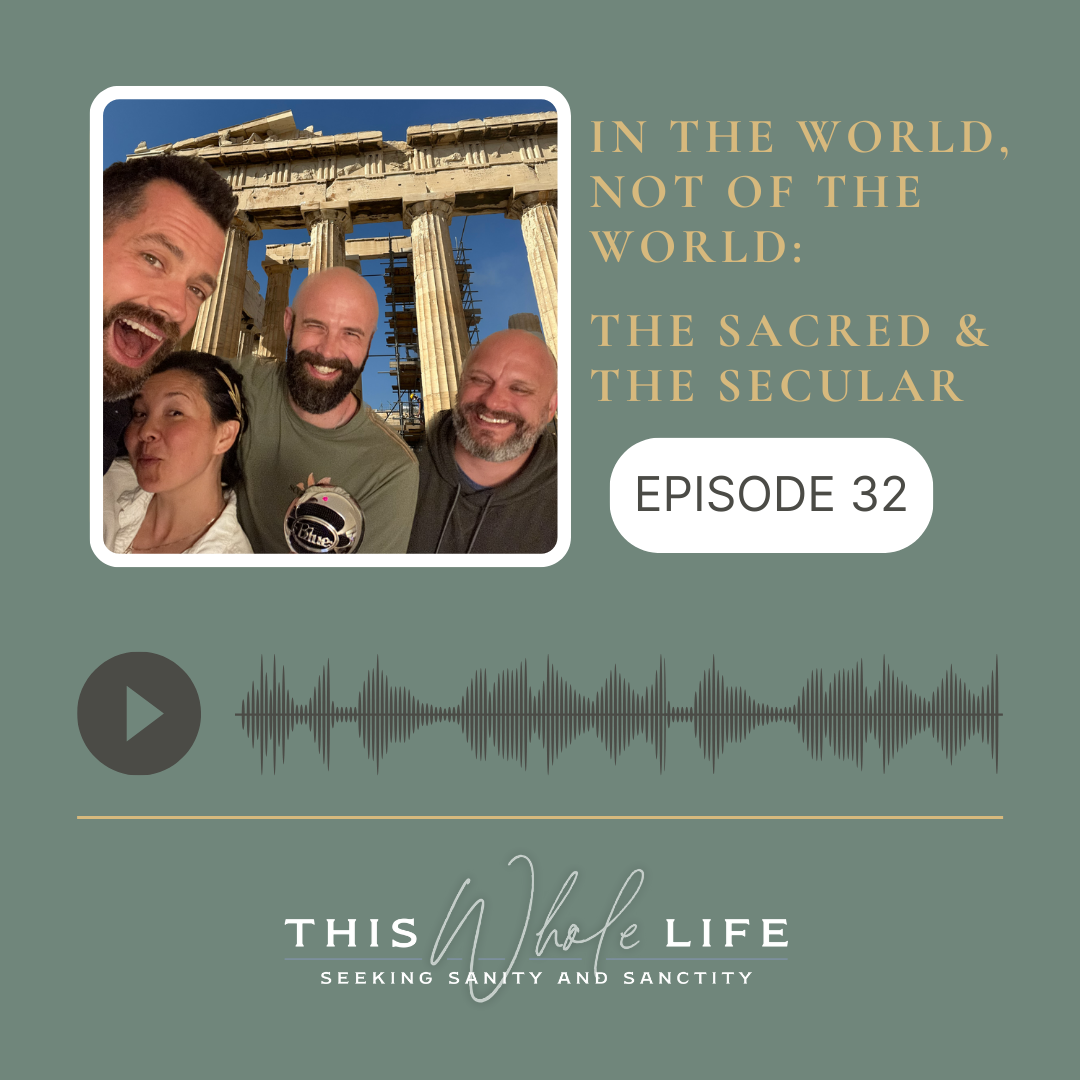Show Notes
Episode 32. In the World, not of the World: the Sacred & the Secular
Episode 32. In the World, not of the World: the Sacred & the Secular
"I do not ask that you take them out of the world but that you keep them from the evil one. ... As you sent me into the world, so I sent them into the world."
~ John 17:15, 18
Let's face it: the fallen world around us is a difficult place to be. We, who desire a healthy and holy life, are surrounded by secular influences and misguided worldviews. What are we supposed to do? How do we stay sane and holy in a secular world? It can be tempting to either give in to the values of this world or run away from it altogether.
But the life and ministry of St. Paul offers us a middle path: engaging the secular as a means of leading others toward the sacred. In this episode, Pat & Kenna are joined by Fr. Nathan LaLiberte and Fr. Luke Marquard in Athens, Greece near the end of a pilgrimage in the footsteps of St. Paul. Together, they delve into the difficult - but invaluable - call to be leaven in the world and to reject fear. This has crucial and practical implications for us, our children, the Church, and the world. Be not afraid!
Show Notes
Paul’s speech at the Areopagus in Acts of the Apostles 17, beginning at verse 16:
While Paul was waiting for them in Athens, he grew exasperated at the sight of the city full of idols. So he debated in the synagogue with the Jews and with the worshipers, and daily in the public square with whoever happened to be there. Even some of the Epicurean and Stoic philosophers engaged him in discussion. Some asked, “What is this scavenger trying to say?” Others said, “He sounds like a promoter of foreign deities,” because he was preaching about ‘Jesus’ and ‘Resurrection.’ They took him and led him to the Areopagus and said, “May we learn what this new teaching is that you speak of? For you bring some strange notions to our ears; we should like to know what these things mean.” Now all the Athenians as well as the foreigners residing there used their time for nothing else but telling or hearing something new.
Then Paul stood up at the Areopagus and said: “You Athenians, I see that in every respect you are very religious. For as I walked around looking carefully at your shrines, I even discovered an altar inscribed, ‘To an Unknown God.’ What therefore you unknowingly worship, I proclaim to you. The God who made the world and all that is in it, the Lord of heaven and earth, does not dwell in sanctuaries made by human hands, nor is he served by human hands because he needs anything. Rather it is he who gives to everyone life and breath and everything. He made from one the whole human race to dwell on the entire surface of the earth, and he fixed the ordered seasons and the boundaries of their regions, so that people might seek God, even perhaps grope for him and find him, though indeed he is not far from any one of us. For ‘In him we live and move and have our being,’ as even some of your poets have said, ‘For we too are his offspring.’ Since therefore we are the offspring of God, we ought not to think that the divinity is like an image fashioned from gold, silver, or stone by human art and imagination. God has overlooked the times of ignorance, but now he demands that all people everywhere repent because he has established a day on which he will ‘judge the world with justice’ through a man he has appointed, and he has provided confirmation for all by raising him from the dead.”
When they heard about resurrection of the dead, some began to scoff, but others said, “We should like to hear you on this some other time.” And so Paul left them. But some did join him, and became believers. Among them were Dionysius, a member of the Court of the Areopagus, a woman named Damaris, and others with them.
“In the world you will have trouble, but take courage [or “take heart”], I have conquered the world.”
John 16:33
“Everything is grace.”
St. Thérèse of Lisieux
St. Teresa of Avila: the first step in a life of holiness and union with God is self-knowledge.
The word “sacred” comes from the Latin word sacer, meaning “holy” or “set apart”
The word “secular” comes from the Latin word saeculum, meaning “world” or “age” or “generation”
Two earlier episodes referenced in Episode 32:
Challenge By Choice
Two options for this Episode’s CBC:
Looking back on your life, what was a secular thing in your past that led you closer to God? How do you know the Lord better because of this event or action?
Is there a secular thing in the world now that might help someone know God better? How can you use that things to help others know and love Christ?

